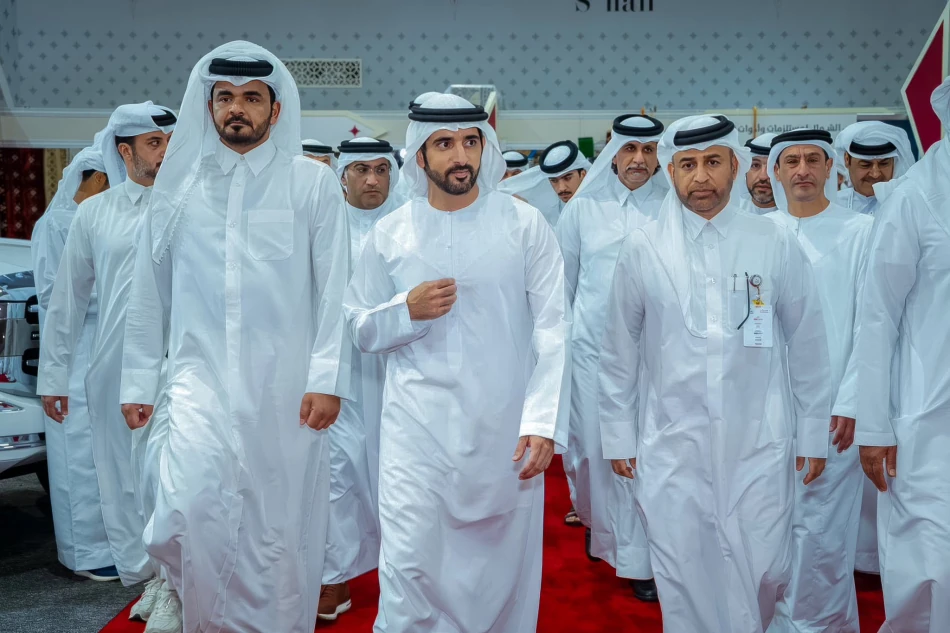
Emirati Crown Prince Pledges Solidarity with Qatar and Its People
Dubai Crown Prince's Qatar Visit Signals Deepening Gulf Unity Beyond Economic Partnerships
Sheikh Hamdan bin Mohammed bin Rashid Al Maktoum's high-profile visit to Qatar's premier falconry exhibition reflects a broader strategic realignment in the Gulf, where cultural diplomacy is reinforcing economic ties and positioning the region as a unified bloc amid global uncertainties. The Crown Prince's emphatic show of support suggests Gulf leaders are prioritizing regional solidarity over past rivalries.
Cultural Heritage as Diplomatic Bridge
The Dubai Crown Prince attended the Katara International Hunting and Falcons Exhibition "Suhail 2025" in Doha, using the traditional sporting event as a platform for broader diplomatic messaging. In his social media statement, Sheikh Hamdan praised the exhibition's "innovations and cultural activities that embody the Gulf people's pride in our authentic heritage and shared legacy."
This emphasis on shared cultural identity represents a calculated diplomatic approach. Falconry, deeply embedded in Bedouin tradition, serves as common ground that transcends political boundaries—a reminder that Gulf states share more than oil revenues and geographic proximity.
Strategic Messaging Behind Royal Visits
The Crown Prince's public declaration of support carried unmistakable political weight: "We ask God to preserve Qatar as an icon of dignity and a beacon of progress, and we in the UAE stand with Qatar and its generous people—they are part of us and we are part of them."
This language signals several strategic priorities for UAE leadership:
Regional Stability Over Historical Tensions
The visit effectively closes the book on the 2017-2021 Gulf blockade that isolated Qatar. While the Al-Ula Declaration formally ended the crisis in January 2021, high-profile cultural exchanges demonstrate that normalization has moved beyond mere diplomatic protocol into genuine partnership.
Economic Integration Through Cultural Soft Power
Both Dubai and Doha compete as regional business hubs, but Sheikh Hamdan's visit suggests a shift toward complementary rather than competitive positioning. Qatar's expertise in energy and sports infrastructure pairs naturally with Dubai's financial services and logistics networks.
Gulf Cooperation Council's New Phase
This diplomatic engagement reflects broader trends reshaping Gulf politics. Unlike previous decades when Saudi Arabia's preferences largely dictated regional alignment, today's Gulf Cooperation Council operates more as a confederation of equals.
The UAE and Qatar have found particular synergy in several areas:
Investment Diversification: Both nations are channeling oil wealth into technology, renewable energy, and knowledge economies. Qatar's sovereign wealth fund and Dubai's free zones offer complementary advantages for international investors.
Geopolitical Hedging: Neither country wants to choose definitively between American and Chinese spheres of influence. Cultural diplomacy provides a way to strengthen regional ties without triggering external pressure.
Implications for Regional Business Environment
For international businesses and investors, this deepening UAE-Qatar cooperation creates new opportunities. The countries' combined market represents over 12 million consumers with among the world's highest per-capita incomes.
Financial Services: Dubai's banking sector and Qatar's capital markets could integrate more seamlessly, potentially creating a Gulf financial hub rivaling Singapore or Hong Kong.
Tourism and Hospitality: Joint marketing of Gulf destinations could attract visitors who previously saw the region as politically unstable or culturally homogeneous.
Looking Beyond Symbolism
While cultural events like falconry exhibitions might seem ceremonial, they serve crucial functions in Gulf diplomacy. Personal relationships between ruling families often determine policy directions more directly than in Western democracies.
Sheikh Hamdan's visit suggests that UAE leadership views Qatar as a long-term strategic partner rather than a competitor. This represents a mature approach to regional politics—recognizing that Gulf prosperity depends on collective success rather than zero-sum competition.
The challenge now lies in translating cultural goodwill into concrete economic and political cooperation that can withstand future regional pressures.
Most Viewed News

 Sara Khaled
Sara Khaled






